We are proud to say that these posts are not sponsored. Our editorial team of Bobbie moms and writers personally select each featured product. If you buy something through our links, we may earn an affiliate commission, at no cost to you.
If you’ve been exclusively nursing or pumping, the decision to introduce baby formula may feel fraught. Whether you plan to supplement your breastfed baby or switch to baby formula entirely, choosing the right product from all of the formulas on the market can be an overwhelming task! This article will guide you through the process of selecting the best formula for breastfed babies, with a focus on organic options and a spectrum of affordability.
Milk Drunk’s Top Picks for Best Formula for Breastfed Babies
- Bobbie Organic Formula
- Bobbie Organic Gentle Formula
- Baby’s Only A2 Organic Milk Infant Formula
- Baby’s Only Organic Complete Nutrition Infant Formula
- Bubs Australia Goat Milk Formula
- Enfamil Enspire Formula
- Similac 360 Total Care Formula
- Store-brand Advantage Premium Formula
How to Choose a Baby Formula
Choosing the best formula for your breastfed baby involves considering various factors about their digestive needs and your personal preferences. Here are some key factors to keep in mind when making your choice:
Organic Infant Formula
For parents seeking a formula that aligns with their preference for organic products, there are several organic infant formulas on the market. These formulas are made from organic whole or skim milk and are sourced from cows raised without the use of antibiotics or synthetic growth hormones. Organic formulas adhere to strict regulations, ensuring they are free from genetically modified organisms (GMOs) and prohibited pesticides.
Human Milk Oligosaccharides (HMOs)
Human milk oligosaccharides are complex carbohydrates naturally found in breast milk. They play a vital role in supporting a baby’s developing immune system and gut health. Some infant formulas now include HMO prebiotics, aiming to mimic the benefits of breast milk more closely.
Plant-Based Formulas
If you’re looking for a plant-based formula, there are options available that use plant-based protein sources such as soy. Plant-based formulas are suitable for babies with dairy allergies or lactose intolerance. These options are also a good choice for families who live a plant-based lifestyle or who have religious restrictions against the use of certain ingredients (or who have concerns about how animal-derived ingredients are handled or processed).
Fatty Acids, Including DHA
Docosahexaenoic acid (DHA) is an omega-3 fatty acid found in breast milk and is essential for brain and eye development. When choosing a formula, look for those that contain DHA to support your baby’s cognitive growth. Many infant formulas now incorporate DHA to provide a comprehensive nutritional profile. If you plan to use a baby formula without DHA, you might consider adding it separately as a supplement.
Liquid Concentrate, Liquid Ready-to-Feed, or Powdered Formulas
You’ll also need to decide between liquid and powdered formulas. Liquid formulas can be more convenient but also come with a higher price tag and must be refrigerated after opening. Powdered formulas are great for travel and storage but may require more precise preparation. The choice between these two formats often comes down to personal preference and lifestyle.
Supplementing with Baby Formula
Supplementing with baby formula is common, especially for mothers who are returning to work or who have difficulty producing enough breast milk. The American Academy of Pediatrics recognizes that formula feeding can be a suitable option when needed or desired!
When supplementing with formula while breastfeeding, consider the following tips to ensure a smooth transition:
- Consult with Your Pediatrician: Before introducing formula to your baby, consult with your pediatrician. They can provide guidance on the best formula for supplementing a breastfed baby based on your baby’s specific needs.
- Offer a Gradual Transition: Start by replacing one breastfeeding session with formula, preferably in the morning so that you can watch for any reaction that may occur. This gradual transition allows your baby to adapt to the new feeding routine.
- Pump to Maintain Supply: Continue to breastfeed or pump when you replace a breastfeeding session with formula if you’d like to maintain your milk supply.
- Choose the Right Bottle: Select a bottle and nipple designed to mimic the breast, such as Evenflo Balance+. A bottle that has a gradually sloped nipple and a wide base is ideal. Experiment with different options to find the one your baby prefers.
- Monitor Your Baby’s Reaction: As you introduce formula, closely monitor your baby’s reaction. Look for any signs of allergies or intolerance such as widespread rash, significant changes in stool consistency, projectile vomiting or inconsolable fussiness. If you notice any concerning symptoms, consult your pediatrician for guidance.
Best Formula for Breastfed Babies
Bobbie Organic Infant Formula
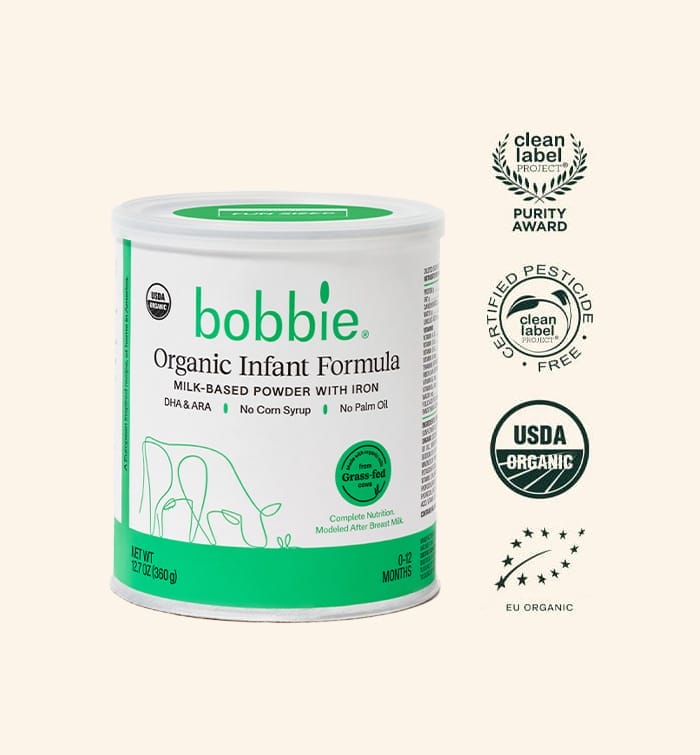
Shop Bobbie Organic Infant Formula
Bobbie Organic Infant Formula is a USDA Organic, EU-style infant formula that meets all FDA requirements. It is a complete nutrition milk-based powder modeled after breast milk and is easy on tummies. It is non-GMO and doesn't have corn syrup, palm oil, or maltodextrin. Learn more about Bobbie.
Pros:
- Protein ratio close to that of mature breast milk
- 100% lactose as a carbohydrate source
- The only baby formula available in the U.S. with both USDA and EU Organic certification
- Clean Label Purity Award and Pesticide-Free certification
- Dairy from grass-fed cows
- Meets EU requirements for DHA and iron
- Available via subscription and at Target stores nationwide
- Simple, high-quality recipe with the essentials that a baby needs and nothing more
- Free from palm oil and soy allergens
Cons:
- No prebiotics
- Available by subscription or at Target and select retailers
Bobbie Organic Gentle Infant Formula
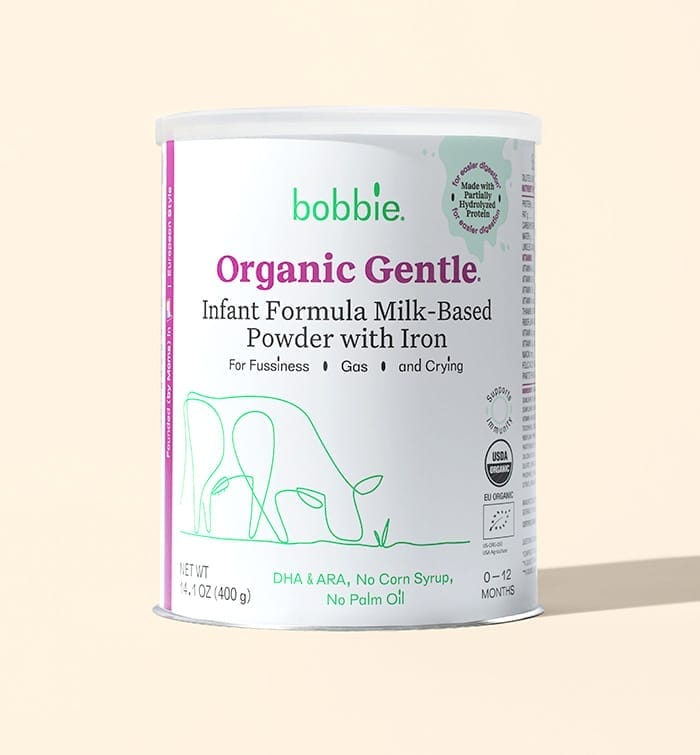
Shop Bobbie Organic Gentle Infant Formula
Bobbie Organic Gentle is the only baby formula in the U.S. market that offers 100% partially-hydrolyzed whey protein and 100% lactose as the carbohydrate source. Our gentle baby formula is easy on sensitive tummies to help alleviate fussiness and gas. Learn more about Bobbie Gentle.
Pros:
- Only gentle, partially-hydrolyzed protein formula on the market to use exclusively lactose as the carbohydrate source
- No corn syrup, maltodextrin, or sucrose
- Partially-hydrolyzed whey protein
- The only gentle formula in the U.S. with both USDA and EU Organic certification
- Meets EU requirements for DHA and iron
- Available via subscription
- No palm oil or soy allergens
Cons:
- No prebiotics or probiotics
- Available by subscription or at Target
Baby’s Only A2 Organic Milk Infant Formula
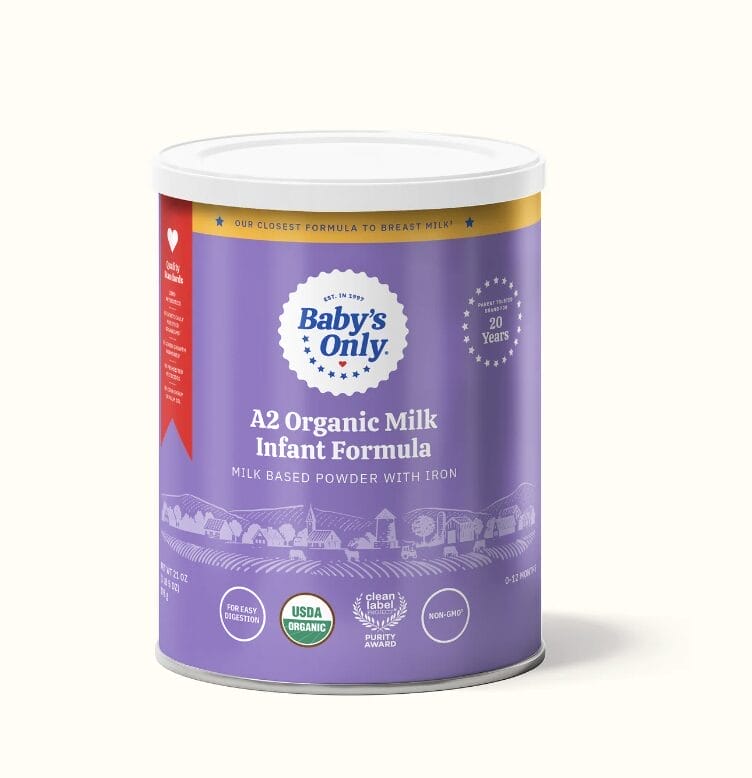
Pros:
- USDA Organic
- 60% whey, 40% casein protein ratio like mature breastmilk
- 100% lactose for carbohydrate source, no corn syrup or maltodextrin
- Contains exclusively easy-to-digest A2 proteins, the same type of beta-casein protein found in breastmilk
- No palm oil
- Availability in store (Target, Walmart) and online
- Budget-friendly
Cons:
- Does not contain DHA or ARA
- No prebiotics or probiotics
Baby’s Only Organic Complete Nutrition Infant Formula
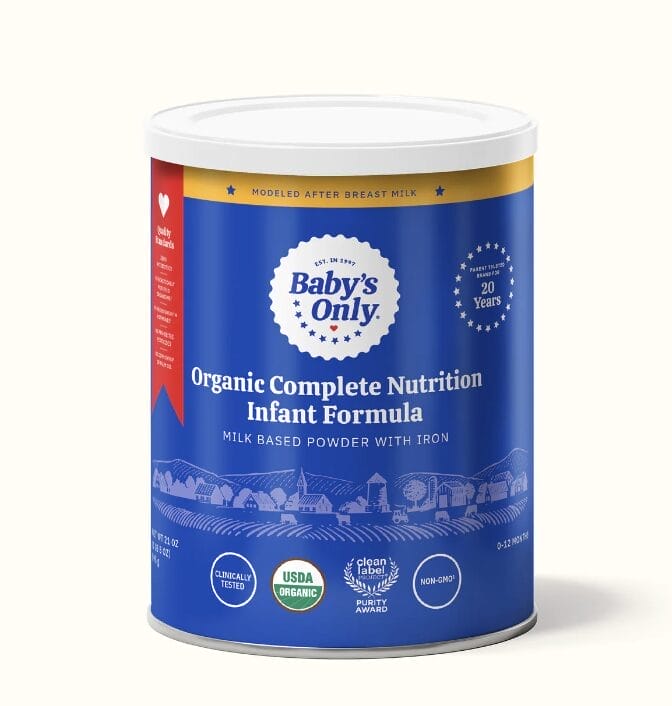
Pros:
- USDA Organic
- 60% whey, 40% casein protein ratio like mature breastmilk
- 100% lactose for carbohydrate source
- No palm oil
- Budget-friendly
- Availability in store (Target, Walmart) and online
Cons:
- Does not contain DHA or ARA
- No prebiotics or probiotics
Bubs Australia Goat Milk Formula
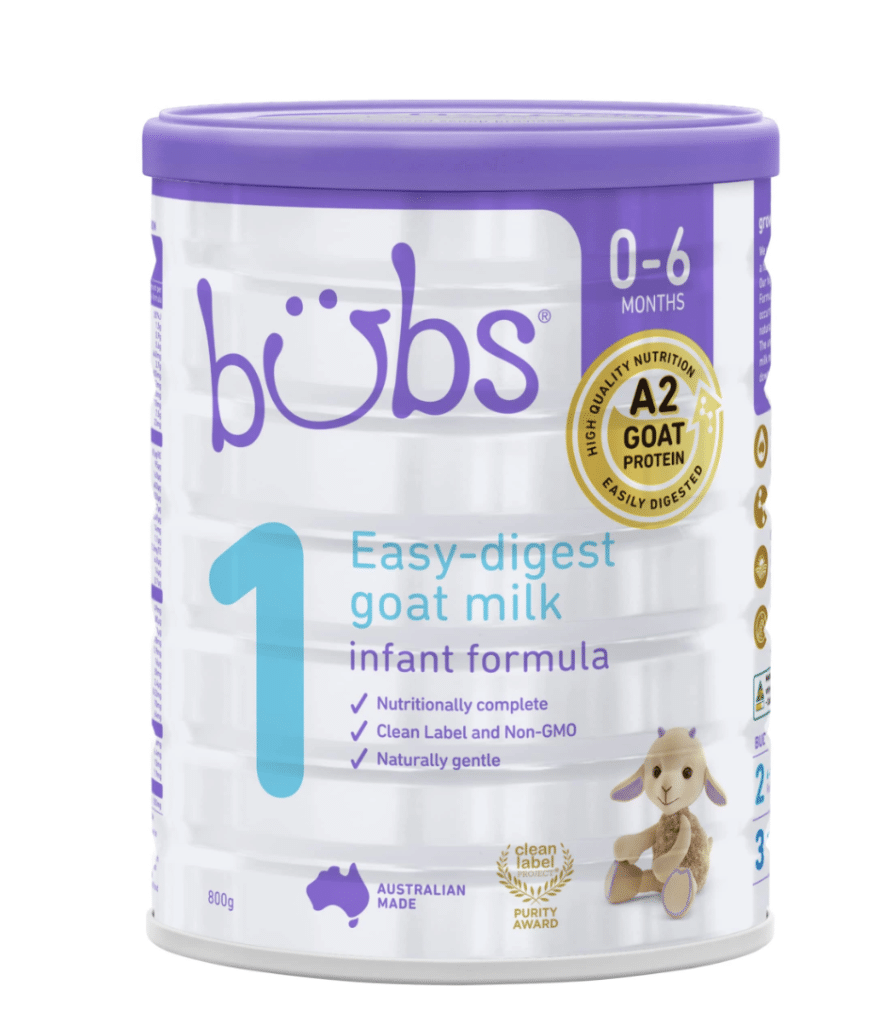
Pros:
- Protein ratio close to that of mature breast milk
- 100% lactose as a carbohydrate source
- Includes prebiotics
- Does not contain soy oil
- Clean Label Purity Award
- Available at many local retailers
Cons:
- Contains palm oil
- Not organic
- Dairy does not come from grass-fed goats
Enfamil Enspire Formula
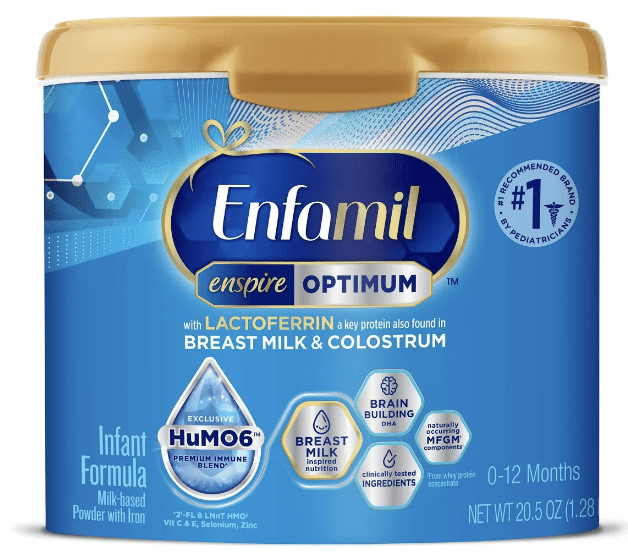
Pros:
- Protein ratio close to that of mature breast milk
- 100% lactose as a carbohydrate source
- Contains prebiotics and lactoferrin
- Includes milk fat globule membrane (MFGM)
- Available at many local retailers
Cons:
- Contains palm oil
- Not organic
- Dairy does not come from grass-fed cows
- Most expensive formula on the market per fluid ounce.
Similac 360 Total Care Formula
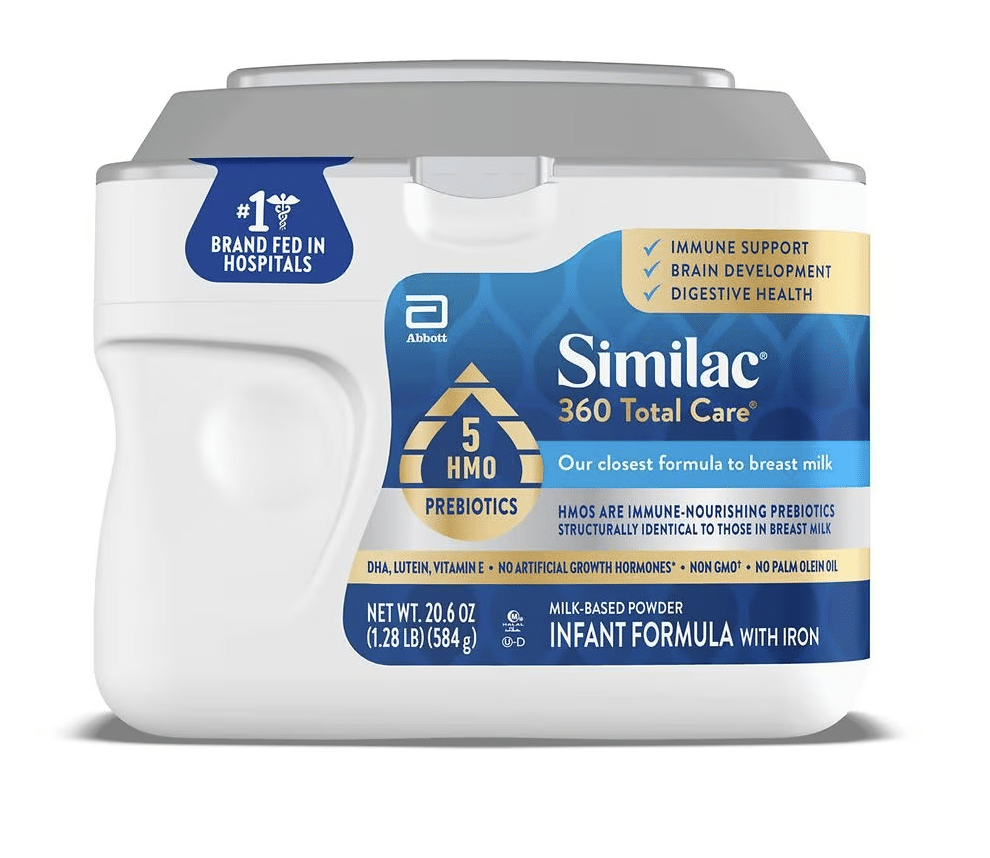
Pros:
- Protein ratio close to that of mature breast milk
- 100% lactose as a carbohydrate source
- Contains prebiotics
- Free from palm oil
- Available in both powder and ready-to-feed formulas
- Available at many local retailers
Cons:
- Includes soy oil
- Not organic
- Dairy does not come from grass-fed cows
Store-brand Advantage Premium Formula*
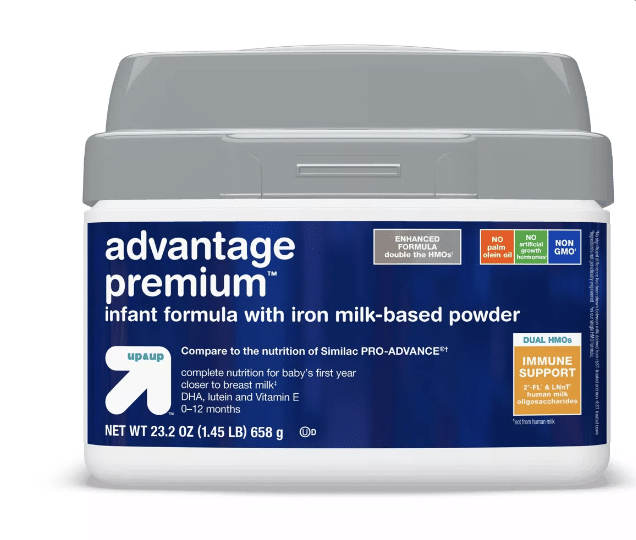
Pros:
- Protein ratio close to that of mature breast milk
- 100% lactose as a carbohydrate source
- Includes prebiotics
- Free from palm oil
- Budget-friendly
- Available at many local retailers
Cons:
- Contains soy oil
- Not organic
- Dairy not from grass-fed cows
*The same recipe is used across stores, so you can choose from Target Up&Up, Walmart Parent’s Choice, Kroger’s Comforts, and other store brand baby formulas.
Choosing the Best Formula for Breastfed Babies
Choosing the best infant formula for your breastfed baby involves considering factors such as ingredients, price, and availability. When supplementing with formula, consult with your pediatrician, transition gradually, and continue to view feeding as an opportunity to bond with your baby. By making informed choices and prioritizing your baby’s nutritional needs, you can ensure they receive the best possible care, whether through breast milk or formula feeding.


